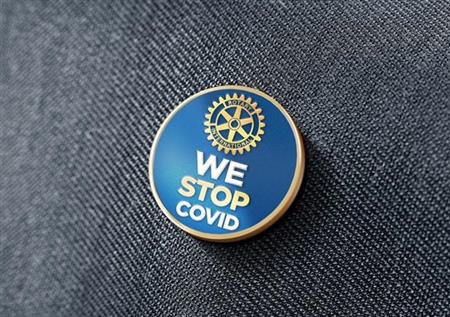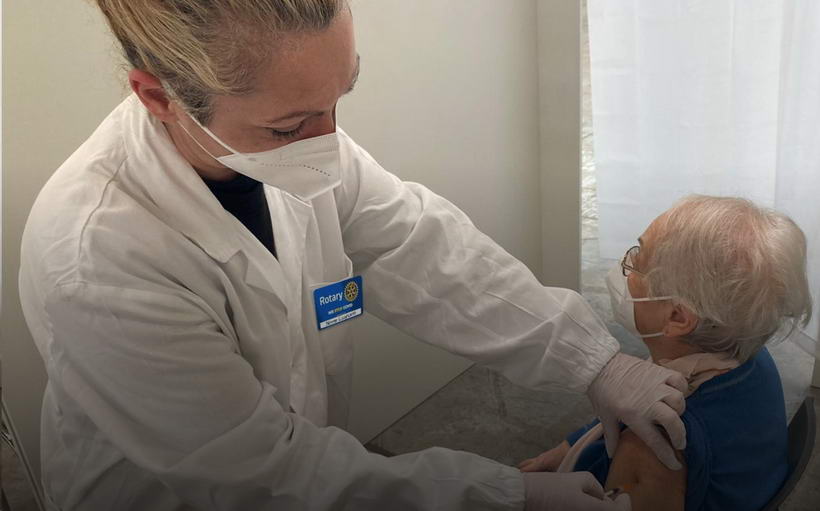
 Riccardo De Paola knew that as Italy’s supply of COVID-19 vaccine doses increased, more people would be needed to administer the shots and staff vaccination sites. He started contacting medical directors in the Verona region about how Rotary clubs could be ready to help — and began mobilizing a volunteer force that has since become a critical government partner.
Riccardo De Paola knew that as Italy’s supply of COVID-19 vaccine doses increased, more people would be needed to administer the shots and staff vaccination sites. He started contacting medical directors in the Verona region about how Rotary clubs could be ready to help — and began mobilizing a volunteer force that has since become a critical government partner.
De Paola, a past governor of Rotary District 2060 (Italy), says the dozen medical directors he talked to in late 2020 all echoed the same refrain: They desperately needed volunteer help to get vaccination sites up and running. De Paola coordinated with the current district governor, Diego Vianello, to recruit volunteers from the region’s 91 Rotary clubs.
“Our members work in so many professions, with deep and diverse expertise. We wanted our volunteers to use their skills in the best way possible,” says De Paola, a founding member of the Rotary Club of Marco Polo Passport D2060, which was chartered in July 2020 with the specific purpose of carrying out coronavirus-related service.
Within a week of the initial call for volunteers in January 2021, more than 150 Rotarians and Rotaractors had stepped forward. The group included several current and retired doctors, nurses, and paramedics. The volunteers were vaccinated and trained in specific health protocols, which vary from city to city.
Some volunteers had to purchase insurance to be able to administer the vaccine. A task force De Paola and Vianello set up worked with insurance brokers to obtain coverage for four retired doctors at a cost of about $300 each. The task force also established a group of volunteer lawyers to review agreements between various municipalities and the volunteers, providing legal support as needed.
“We even had a member who was a professional notary who could notarize the insurance papers and documents,” De Paola adds. “We weren’t just providing volunteers, we were providing our organization, our resources, our experience, and our reliability.”
Members typically teamed up in groups of four to work a morning or afternoon shift, logging patient names in a database, coordinating with other volunteers and, if they were qualified, administering shots.
Impressed with how quickly and efficiently the Rotary members had mobilized, medical authorities in Verona put the Rotary district in charge of all COVID-19 vaccine volunteer activities in the region, including scheduling patients, assigning shifts, and reporting data.
De Paola says the sanitary director for the city of Treviso credited Rotary with making it possible to increase the number of vaccinations and lauded Rotary members for helping officials reach an incredibly important goal.
The task force’s volunteer roster has grown to more than 700 people, representing more than 25,000 of hours worked that's worth over $1 million, and more than 300,000 people in the region have been vaccinated as a result, De Paola says. Those numbers are expected to increase sharply when Italy ends its current lockdown, which was triggered by a deadly spike in COVID-19 cases in early February.
These efforts have been adopted by all Rotary districts in Italy. Inspired by Rotary’s “End Polio Now” campaign, De Paola and Vianello call their initiative “We Stop COVID.” All volunteers at the vaccination sites, including nonmembers, wear “We Stop COVID” badges and pins with Rotary branding.
Vianello says Rotary’s involvement in this historic effort has greatly increased the public’s awareness of the organization.
“‘We Stop COVID’ has been a great boost for us. Communities are seeing the impact Rotary is having,” he says. “Our clubs have a new energy.”